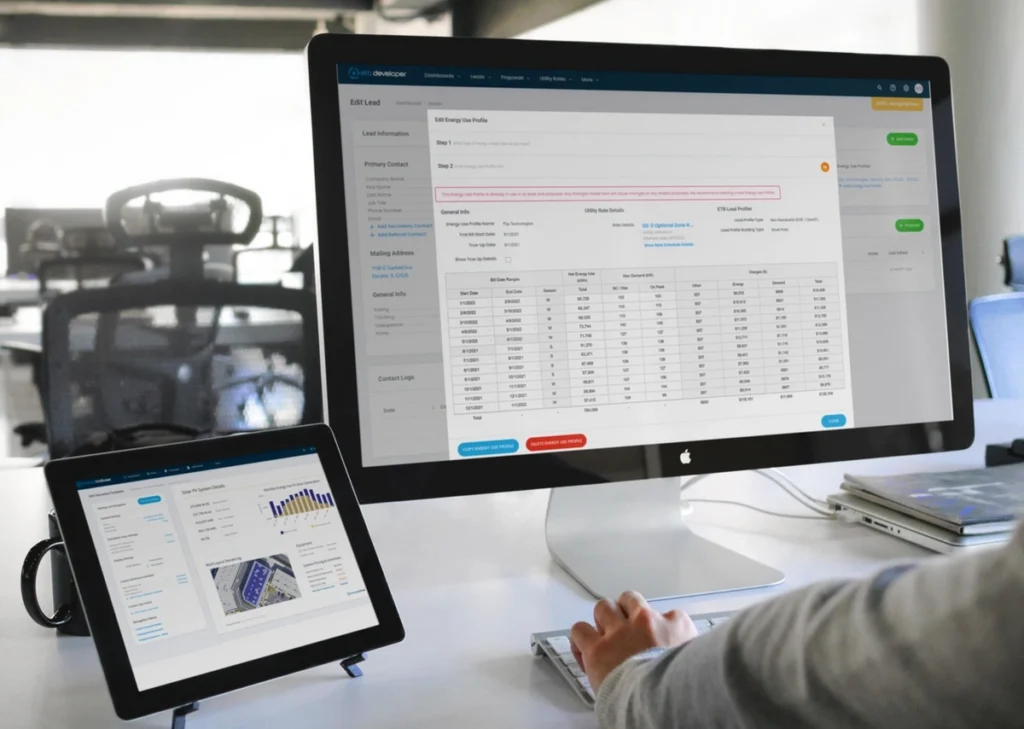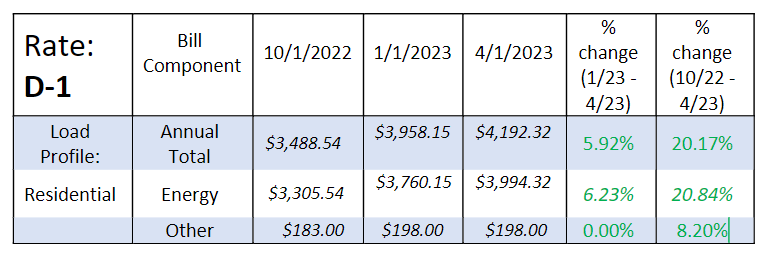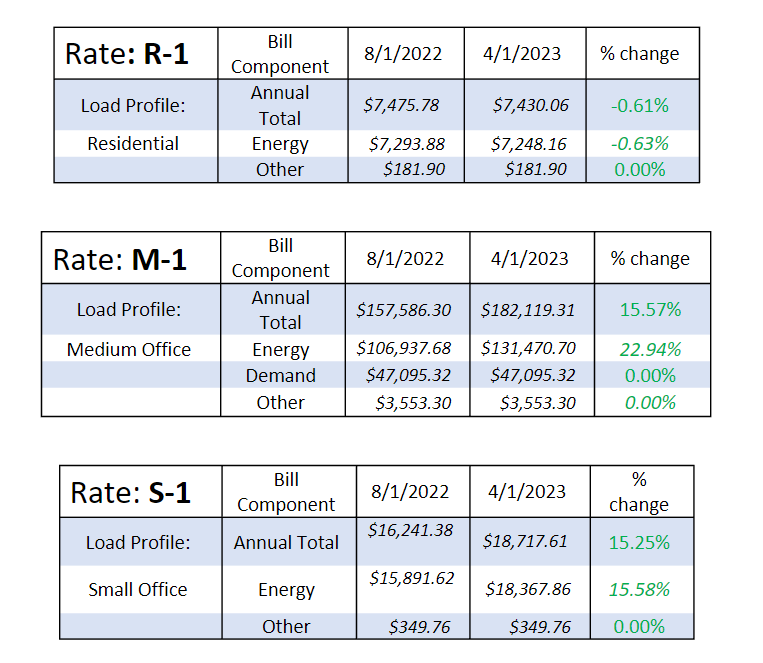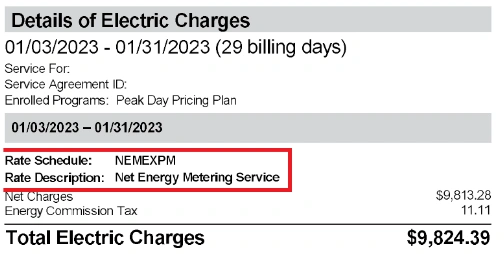IMPORTANT MONTHLY UPDATES & ANNOUNCEMENTS
In this month’s newsletter, we highlight two utilities (NV Energy in Nevada and Pasadena Water and Power in California) that implemented significant increases to their fuel-related charges. We discuss new rate restructurings for Jacksonville Energy Authority and incoming rate hikes due to its involvement with Plant Vogtle in Georgia. Lastly, we explain how to determine your customer’s rate schedule after going solar with PG&E.
NV Energy’s Fuel Adjustment Increases
NV Energy’s second quarterly update went into effect this month with significant increases in fuel-related charges for the company’s northern and southern branches, the Nevada Power Company and Sierra Pacific Power Company, respectively. Customers of both companies can expect around a 6% increase in their monthly bills this quarter.
This update follows the historic January rate increase by NV Energy, which implemented its quarterly update to the Base Tariff Energy Rate (BTER) for the northern and southern branches. It also increased Northern’s Base Tariff General Rate (BTGR) for the first time in 10 years. The BTGR is used to cover service costs and earn a profit, while the BTER is based on the costs of purchasing fuel to generate energy.
The new year update increased bill totals by about 12-14%, depending on the rate class. After this second quarterly update, customer bill totals have increased by approximately 15-20% this year. Our rates team used an Energy Use Profile to test and compare the annual bill totals for the past three updates to Sierra Pacific Power Company’s “D-1” residential rate, and the following results show the steep increases that took effect this year:
These increases to the BTER occurred despite decreasing fuel prices in recent months because the BTER lags by 12 months—recent increases to the BTER reflect fuel prices from a year ago when NV Energy covered the costs of dramatic spikes in fuel prices for customers. This leveled out the billing, which means customers can expect higher bills like this for longer.
Pasadena Water and Power Responds to Fuel Price Hikes
Pasadena Water and Power (PWP) updated its power cost adjustment (PCA) for the first time since 2019. The PCA increased from 2.98 cents per kWh to 5.48 cents per kWh, with another expected increase to 5.98 cents in May. Our rates team compared the previous PWP update from 8/1/2022 to this month’s update, and then we extrapolated the updated rates across the next year to determine this update’s effect on annual bill totals. We utilized residential, medium, and small office load profiles in ETB Developer’s Energy Use Profile for PWP’s R-1, M-1, and S-1 rates. The following tables display our results:
R-1 customers were relatively unaffected by this month’s update, while M-1 and S-1 customers, conversely, saw annual total bill increases of 15%. As the results demonstrate, the PCA can have a significant impact on annual cost projections; therefore, moving forward, our rates team will review and update PWP’s rates monthly to make sure we include the most recent PCA.
Jacksonville Energy Authority Rate Changes and Future Increases
This month, new rates went into effect for Jacksonville Energy Authority (JEA) customers. With this update, JEA sought to increase the basic monthly charge, decrease energy charges, and remove environmental charges.
The basic monthly charge more than doubled for most of JEA’s common rate schedules:
Along with this increase, JEA reduced the base energy rates and removed the environmental energy charges. On average, base energy rates (base energy rates exclude the fuel cost adjustment, which still constitutes the largest percentage of the bill) decreased by about 10%. The overall result of these changes is that high-energy consumers will save. In contrast, low-energy consumers will likely see higher bill totals due to the increases in the static monthly charge. Unfortunately, JEA’s redistribution of its revenue allocation to recover more from the basic monthly charge does impact the appeal of solar for new customers since customers are left with a much greater monthly charge that cannot be offset by exported energy.
JEA’s increase to the monthly charge is to cover the maintenance costs for meters and electrical wires; however, JEA also needs more revenue to keep abreast with inflationary costs and costs associated with purchasing power from Plant Vogtle in Georgia. JEA entered into an agreement in 2008 to purchase power generated by nuclear energy from Plant Vogtle. Initially, JEA was projected to pay $1.4 billion over a 20-year period from 2023 to 2043; however, due to delays and legal issues, current estimates have raised that projection to $4.7 billion. JEA’s continually increasing bill for Plant Vogtle results in continually increasing rates for JEA customers.
ETB Developer’s Pre-Proposal Service
As we enter the second quarter, now is the perfect time to try our new Pre-Proposal Service. This service was designed with our users in mind to save you time by letting our rate experts handle every aspect of the rate creation and Energy Use Profile process. This lets you focus on closing more projects and getting more leads while our rates team prepares your Proposal for success! For information on how to submit a Pre-Proposal Service request, click here.
First Quarter Platform Additions
Our utility rates team enjoys sharing our progress with ETB Developer users because much of it comes from user requests! Every utility and rate we add signifies expanding opportunities for solar, and we think that is pretty neat! We quantify our Q1 successes below:
- New rates added: 468
- Updated rates: 1,543
- Pre-Proposal Service average turnaround time: 2.2 days
- New utilities added: 27
- 19 different states
- 3 different countries
Did you know? – PG&E Bills Change Post-Solar
When a PG&E customer goes solar, the typical bills they receive detailing their rate schedule and electric charges change. The new bills replace the actual rate schedule name that a customer is on with the NEM program they are enrolled in:
Not only does this new bill not indicate the customer’s rate schedule, but it also does not provide details on PG&E energy charges, credits for exports, or the total amount paid for non-bypassable charges (NBCs). To determine the rate schedule your customer is on, refer to the “Net Energy Metering Detail of Bill” found in the customer portal on PG&E’s website. This bill will list the rate name in the upper right-hand corner along with the NEM program:
In the example above, the rate schedule is “B19S”; the “S” stands for “Secondary,” which is the voltage type. Rate “B19” is a common rate found in Energy Toolbase along with the “Secondary” voltage option.
If you encounter a bill with a rate that we do not have in Energy Toolbase, or if you need assistance interpreting a bill, please get in touch with our utility rates team at utilityraterequest@energytoolbase.com, and we would be happy to help!
Join our Utility Rates Webinar Series!
We’re hosting bi-monthly training sessions on everything related to utility rates and how they are used when modeling projects. Register below for a session:
Utility Rates Training Session (hosted monthly)
- Utility rate structure/components
- ETB’s approach to creating a rate
- How to create your own rate in ETB Developer
- Billing examples and ETB’s tips and tricks
- Best practices for entering data into ETB Developer
- Net Metering Programs
Market-Specific Utility Rates Training (hosted monthly)
- Components of real-life bill examples in specific market/utility territories
- A deep dive into the various charge types utilized by electric companies in specific territories
- Review the ways to obtain the most effective rate information from utilities








